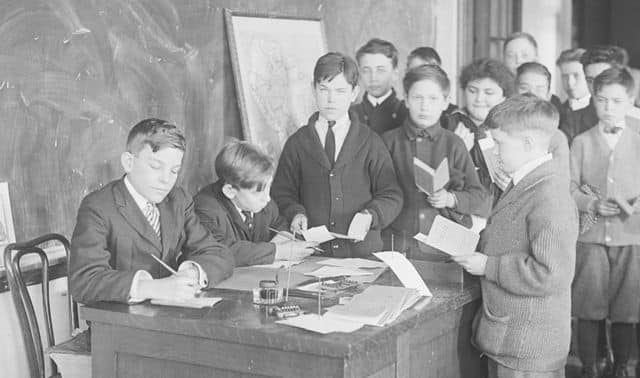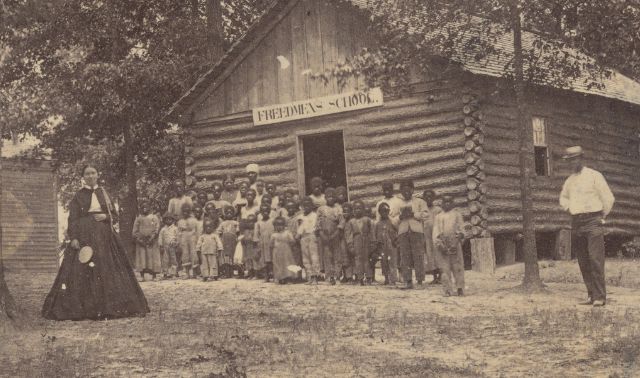My uncle Martin Hendrickson was fearless. Large and unyielding in principle, he never let a man get away with bullying, or a woman be treated poorly. He was a pillar of his community, the first to leap into action when there was trouble, and so likable that everyone in town called him “Uncle Mart.” This Kansas farmer had a mysterious side, too—one of uncannily accurate premonitions. In fact, Uncle Mart saved more than one life by acting on his visions.
It doesn’t seem unusual that I’d be so well-acquainted with my uncle—until you know he was born in 1834. And everything I’ve learned about this Indian-fighting, larger-than-life buffalo hunter came from old books.
Uncle Mart isn’t the first ancestor I’ve gotten to know through out-of-print or hard-to-find books. Anecdotes in a North Carolina collection of backwoods tales tells about my fourth-great-grandfather; other books mention my Ballards who lived in Williamsburg, Va., about the same time as Thomas Jefferson. One of my most valuable finds was a well-researched volume that traced the Shore family back to 1678 Switzerland.
Not bad for a few hours of online book shopping—a feat you too can achieve. In fact, if you’re willing to spend time tracking down local and regional histories, as well as educating yourself on some basic history, you can learn as much about someone in your family as I did about my Uncle Mart. Simply follow these lessons to locate pages from the past.
Chapter 1: Portals to publications
Although the Web has several small used-book stores (some specializing in history or genealogy), I suggest you start at two of the largest sites: Advanced Book Exchange (ABE) abebooks.com and Alibris alibris.com. Both serve as clearinghouses for thousands of independent booksellers, and have a combined inventory of about 70 million books. If you can’t find a book here, chances are it may not be for sale.
You can search ABE’s and Alibris’ databases by title, author or subject. Use the Advanced Search if you want to narrow your findings—it lets you filter the results by publisher, binding type, edition, date published, author inscription or price range.
Many out-of-print and hard-to-find genealogy and history books are being republished, so it’s not unusual to find a wide range of prices between a reprint and the original. For example, I bought a reprint of The Story of Lone Jack, a book with information about my Lone Jack, Mo., ancestors, for $7.50, while a rarer version sold for more than $100. A quick way to comparison shop is by using BookFinder bookfinder.com, a search engine that scours bookseller sites (including Barnes & Noble www.bn.com and Amazon.com www.amazon.com), and returns results sorted by price.
If you can’t find your book on ABE, Alibris or BookFinder, use your favorite search engine, such as Google www.google.com, to hunt for bookstores that specialize in genealogy or regional histories. A Google search for delaware genealogy books found several sites, including Green’s Used Genealogy Books home.earthlink.net/~genbooks and Appleton’s Books and Genealogy www.appletons.com. Broaden your query to genealogy books, and you’ll find dozens more sites.
Other online resources include Tom Folio tomfolio.com and Amazon.com partner Bibliofind bibliofind.com, which searches Amazon.com and that site’s independent sellers. And don’t overlook eBay ebay.com: Although it’s not commonly thought of as a bookseller, its auctions frequently feature rare or out-of-print genealogy books and maps.
Chapter 2: Table of contents
As a California-based genealogist, I don’t run across much Kentucky, Virginia or North Carolina material at my local chain bookstore. That’s one of the reasons I do so much online book shopping. Using ABE or any of the other umbrella organizations, I can tap into regional inventories all over the United States and the world.
Because of the sheer numbers involved (remember those 70 million books?), you have a good chance of finding county or local histories relevant to your research. And if your ancestors settled a region early in its development, they’re probably mentioned. If not, you’ll still have a great read about a place and time in which your forebears lived.
Other common online finds are genealogical society journals, such as The New England Historical and Genealogical Register, Kentucky Ancestors or Virginia Genealogist. Looking for a census index or transcription? Here’s your chance to fill your library. A quick cruise through ABE turned up 1850 Census, Van Zandt County, Texas and 1787 Tax Lists for West Virginia: Harrison.
Want more vital records? How about the Marriage Bonds of Bedford County Virginia 1755-1800 or Baltimore Birth Records 1865-1894? If it’s military records you want, you’ll find such items as U.S. Naval Pensions 1828, Revolutionary War Invalid Pensions and Twenty-Four Hundred Tennessee Pensioners, Revolution and War of 1812. There’s something for almost everyone.
When you’re searching for books, don’t forget to go map shopping, too. Used-book stores have collections of old maps and atlases that provide an accurate picture of the world your ancestor traveled.
Chapter 3: Answer keys
Knowing what to search for isn’t as difficult as you might think. When looking for a regional book or a county history, first go to an online used-book store and type keywords such as lincoln county kansas, lincoln county history or kansas genealogy. The results should give you a good idea of what books likely contain family information.
I also look for books written around the turn of the past century; these works are filled with reminiscences of people who lived at the same time as my mid-19th-century ancestors.
Next, I go to BookFinder and type a place name in the Title box. The results frequently contain excellent books I might never have found otherwise. For example, when I searched for surry county, I found tax lists, wills, maps, deed abstracts and histories. You can use the same trick to search for genealogies; just type your surname in the Title box and see what comes up.
Look for interesting titles on historical society Web sites, too. Local and state societies often sell self-published books of cemetery transcriptions or will abstracts. I use the titles listed on these sites to track down used copies, or I buy the books from a society.
Lastly, become a historian. The more you know about a town’s history, the better equipped you’ll be to track down family records and stories. If I hadn’t read about the Cheyenne Dog Soldier raids in Lincoln, Kan., it would never have occurred to me to look for Uncle Mart (and other Hendricksons) in history books about the Battle of Summit Springs—the Colorado aftermath of the Lincoln raids. You can’t do genealogy without doing history.
So get out there and get searching. While you’re at it, let me know if you run across a copy of Ancestors and Descendants of Frederick Shore. I promised my aunt I’d find it for her.



